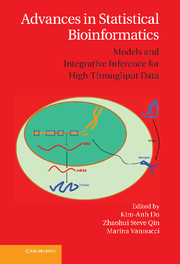Book contents
- Frontmatter
- Contents
- List of Contributors
- Preface
- 1 An Introduction to Next-Generation Biological Platforms
- 2 An Introduction to The Cancer Genome Atlas
- 3 DNA Variant Calling in Targeted Sequencing Data
- 4 Statistical Analysis of Mapped Reads from mRNA-Seq Data
- 5 Model-Based Methods for Transcript Expression-Level Quantification in RNA-Seq
- 6 Bayesian Model-Based Approaches for Solexa Sequencing Data
- 7 Statistical Aspects of ChIP-Seq Analysis
- 8 Bayesian Modeling of ChIP-Seq Data from Transcription Factor to Nucleosome Positioning
- 9 Multivariate Linear Models for GWAS
- 10 Bayesian Model Averaging for Genetic Association Studies
- 11 Whole-Genome Multi-SNP-Phenotype Association Analysis
- 12 Methods for the Analysis of Copy Number Data in Cancer Research
- 13 Bayesian Models for Integrative Genomics
- 14 Bayesian Graphical Models for Integrating Multiplatform Genomics Data
- 15 Genetical Genomics Data: Some Statistical Problems and Solutions
- 16 A Bayesian Framework for Integrating Copy Number and Gene Expression Data
- 17 Application of Bayesian Sparse Factor Analysis Models in Bioinformatics
- 18 Predicting Cancer Subtypes Using Survival-Supervised Latent Dirichlet Allocation Models
- 19 Regularization Techniques for Highly Correlated Gene Expression Data with Unknown Group Structure
- 20 Optimized Cross-Study Analysis of Microarray-Based Predictors
- 21 Functional Enrichment Testing: A Survey of Statistical Methods
- 22 Discover Trend and Progression Underlying High-Dimensional Data
- 23 Bayesian Phylogenetics Adapts to Comprehensive Infectious Disease Sequence Data
- Index
- Plate section
14 - Bayesian Graphical Models for Integrating Multiplatform Genomics Data
Published online by Cambridge University Press: 05 June 2013
- Frontmatter
- Contents
- List of Contributors
- Preface
- 1 An Introduction to Next-Generation Biological Platforms
- 2 An Introduction to The Cancer Genome Atlas
- 3 DNA Variant Calling in Targeted Sequencing Data
- 4 Statistical Analysis of Mapped Reads from mRNA-Seq Data
- 5 Model-Based Methods for Transcript Expression-Level Quantification in RNA-Seq
- 6 Bayesian Model-Based Approaches for Solexa Sequencing Data
- 7 Statistical Aspects of ChIP-Seq Analysis
- 8 Bayesian Modeling of ChIP-Seq Data from Transcription Factor to Nucleosome Positioning
- 9 Multivariate Linear Models for GWAS
- 10 Bayesian Model Averaging for Genetic Association Studies
- 11 Whole-Genome Multi-SNP-Phenotype Association Analysis
- 12 Methods for the Analysis of Copy Number Data in Cancer Research
- 13 Bayesian Models for Integrative Genomics
- 14 Bayesian Graphical Models for Integrating Multiplatform Genomics Data
- 15 Genetical Genomics Data: Some Statistical Problems and Solutions
- 16 A Bayesian Framework for Integrating Copy Number and Gene Expression Data
- 17 Application of Bayesian Sparse Factor Analysis Models in Bioinformatics
- 18 Predicting Cancer Subtypes Using Survival-Supervised Latent Dirichlet Allocation Models
- 19 Regularization Techniques for Highly Correlated Gene Expression Data with Unknown Group Structure
- 20 Optimized Cross-Study Analysis of Microarray-Based Predictors
- 21 Functional Enrichment Testing: A Survey of Statistical Methods
- 22 Discover Trend and Progression Underlying High-Dimensional Data
- 23 Bayesian Phylogenetics Adapts to Comprehensive Infectious Disease Sequence Data
- Index
- Plate section
Summary
Introduction
The major known genomic alterations related to cancer include nucleotide substitution mutations, small insertions/deletions, copy number gains and losses, chromosomal rearrangements, and nucleic acids of foreign origin. Early genomics studies focused on examining only one type of genomic alteration at a time and achieved some success. For example, copy number variations have enabled the discovery of many oncogenes in ovarian cancer (Nanjundan et al., 2007), melanoma (Scott et al., 2009), and lung carcinoma (Bass et al., 2009). Similarly, directed sequencing technologies have found many genes related to specific types of cancer (Pao et al., 2004; Stephens et al., 2004; Mosse et al., 2008).
However, because different types of genomic alteration illuminate different aspects of the cancer genome, we can integrate several types of alteration derived from the same set of tumors to determine important genes involved in cancer initiation, development, and progression. There are two main advantages of such integration studies. The first is that integration can increase the precision, accuracy, and statistical power of identifying cancer-related genes compared with analyzing any single type of alteration. The reason for this is that cancer is thought to be primarily caused by random genetic alterations via different mechanisms. Although each type of alteration may be rare, the cumulative number of different alterations can indicate that a gene is important in a certain cancer. For example, The Cancer Genome Atlas (TCGA) glioblastoma project integrated targeted sequencing, copy number, and expression profiling of more than 400 tumor samples to define core pathways of deregulation in glioblastoma (The Cancer Genome Atlas Network, 2008) and discovered four molecular subtypes (Noushmehr et al., 2010; Verhaak et al., 2010).
- Type
- Chapter
- Information
- Advances in Statistical BioinformaticsModels and Integrative Inference for High-Throughput Data, pp. 292 - 311Publisher: Cambridge University PressPrint publication year: 2013

